- Prelude
- Hard Talk
- New Media
- Rolex : An Overview
- The age of Revivals: Neoclassical Furniture
- Democratization of the Medium No-Budget film: the Indian Context (!)
- Old Sound New Sound
- Decan Odyssey
- North East Opsis
- Russian cool breeze in hot Paris
- Around Kolkata
- Musings from Chennai
- In and around Santiniketan
- In between – from Vadodra
- A Tryst with Art in Madhya Pradesh
- Through the Looking Glass
- The Foreign Connection
- Market Insight
- Market Report
- Artist Index and Statistics
- Auction Reports
- The month that was
- Delhi Dias
- Art Bengaluru
- Mumbai Art Sighting
- Creative Impulse
- Subodh Gupta
- Pooja Iranna
- Preview
- In the News
ART news & views
Democratization of the Medium No-Budget film: the Indian Context (!)
Volume: 2 Issue No: 9 Month: 10 Year: 2010
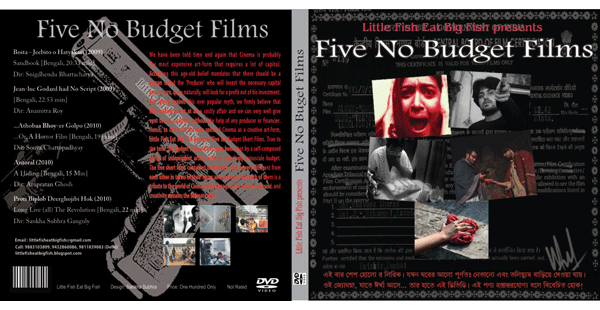
Everyone has their own perception of no-budget film. The term evokes a general idea of an inexpensive production procedure. This idea is very much associated to the personal experiences of the recipient. Difference in socio-economic situations may lead to different understandings of the term. As per example, Michael W Dean makes a film for $6,000, spends $14,000 in promotional activities for a period of two years and calls the film a no-budget; whether Snigdhendu Bhattacharya makes his The Sandbook for 600 INR. Snigdhendu is a journalist at the Hindustan Times and lives in West Bengal whereas; MWD is a self-employed man living in the states. Recently Michael has moved from California to Wyoming, so, very natural, you see.
At first, let me approach the primary issues very clearly. This is not at all an academic paper. I won't be defining no-budget film here. Whatever the degree behind my name may suggest, I am not a student or academician. In fact, if I'm a student I'm not an artist and if I'm an artist I just can't be considered as a student passed out of any institution. And life has always been such a paradox you know!
So, in spite of defining the term I would rather like to recapitulate the different views I got in touch with while interviewing different no-budget filmmakers of different origins.
"It's a film you make without a budget regardless of what it costs. You know you don't have money when you start and you get what you need as you go."
Michael W Dean
(Maker of D.I.Y or Die: How to Survive as an Independent Artist)
"In pure, that is to say, realistic terms, a 'no-budget film' is a myth. Leave no- budget film to rich kids. For the rest of us, having a plan, and having a budget are essentials, not just media hype. I'm tired of no-budget sites that begin 'whether your budget is $2000 or $100,000’ that looks to me like a budget. It would be more accurate to speak about low-budget, non-commercial or volunteer-led film-making, rather than 'no-budget' filmmaking."
Dr. Ian McCormick
(Community Filmmaker, Associated to ICFF & the Birmingham School)
"…a more personal enterprise; a dark living room and an audience of one, in fact, maybe on an airoplane with a laptop and some headphones --- intimate films for intimate viewings."
Amir Motlagh
(Maker of Whale, a no-budget feature and other shorts)
"In terms of democracy, I think that it is always important to have people telling stories which are free of financial influence…... real creative freedom. Freedom to create movies that would and could not be made under the old ways of financing a movie."
Clive Davies-Frayne
(The man who wrote the Lone Gun Manifesto)
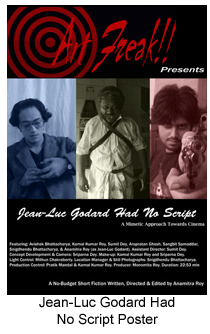 Let's keep it short and move on to the advent of this new production procedure widely known as the no-budget, zero budget or the micro budget filmmaking. In the mid 80s, digital camcorder became available from the house of multinational electronic merchants. In those days videography was not as inexpensive as it is now-a-days. But as the time passed by, filmmaking became a much low cost process with the digital revolution in the 90s. This was just one reason but there were other factors too which motivated new coming filmmakers to work outside the industry. The obstinacy of the Filmmakers' Cooperative (The New American Cinema Group), Influence of the legend of John Cassavetes, the new Hollywood of Indies like Dennis Hopper in the 70s, the urge of staging the personal art and finally, with film ticket prices increasing every year, the urge to bypass the movie producing business machine i.e. the mainstream film industries --- all these factors together led to the birth of zero budget filmmaking. In 1999, The Blair Witch Project redefined the concept of low-budget production. The film was made for $30k only. The makers then had to spend more 30K for a good print of the film to exhibit it at the Sundance. The film went on to earn a good amount of revenue till date in proportion to the money invested. Finally in the year 2002, MWD (Michael W Dean) came up with his 55 minutes' documentary on the D.I.Y (Do It Yourself) movement. Within two years of release, D.I.Y or Die: How to Survive as an Independent Artist became quite a popular film in split communities of America and Europe.
Let's keep it short and move on to the advent of this new production procedure widely known as the no-budget, zero budget or the micro budget filmmaking. In the mid 80s, digital camcorder became available from the house of multinational electronic merchants. In those days videography was not as inexpensive as it is now-a-days. But as the time passed by, filmmaking became a much low cost process with the digital revolution in the 90s. This was just one reason but there were other factors too which motivated new coming filmmakers to work outside the industry. The obstinacy of the Filmmakers' Cooperative (The New American Cinema Group), Influence of the legend of John Cassavetes, the new Hollywood of Indies like Dennis Hopper in the 70s, the urge of staging the personal art and finally, with film ticket prices increasing every year, the urge to bypass the movie producing business machine i.e. the mainstream film industries --- all these factors together led to the birth of zero budget filmmaking. In 1999, The Blair Witch Project redefined the concept of low-budget production. The film was made for $30k only. The makers then had to spend more 30K for a good print of the film to exhibit it at the Sundance. The film went on to earn a good amount of revenue till date in proportion to the money invested. Finally in the year 2002, MWD (Michael W Dean) came up with his 55 minutes' documentary on the D.I.Y (Do It Yourself) movement. Within two years of release, D.I.Y or Die: How to Survive as an Independent Artist became quite a popular film in split communities of America and Europe. 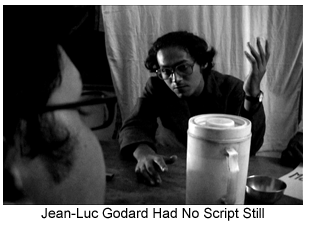 In an interview, MWD told me that he had made a profit of $30,000 within that period which is a very rare and big amount to gain in the no-budget film circuit. It was the beginning, so to speak. Now-a-days, we (of course a very limited number of people in India) get to hear names like Jarrod Whaley, Tom Russel, Lucas McNelly, Andy Horbal and get to know about Jonas Mekas' new project of making 365 films in 365 days only for iPods etc. No-budget filmmaking is now a popular method almost a decade old.
In an interview, MWD told me that he had made a profit of $30,000 within that period which is a very rare and big amount to gain in the no-budget film circuit. It was the beginning, so to speak. Now-a-days, we (of course a very limited number of people in India) get to hear names like Jarrod Whaley, Tom Russel, Lucas McNelly, Andy Horbal and get to know about Jonas Mekas' new project of making 365 films in 365 days only for iPods etc. No-budget filmmaking is now a popular method almost a decade old.
Finally to the Indian context, the space is limited, so first thing first; I really don't have any idea of how the no-budget fruit appeared on the Indian tree! May be a classical Marxist approach would help me get this thing resolved. I personally approached Mr. Anindya Sengupta of Film Studies dept. at the Jadavpur University some months ago to help me get out of this riddle. 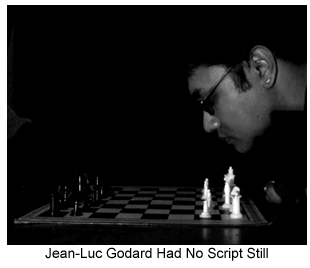 He was the most suitable person undoubtedly but he never really had that much time. Internet really does not have much contribution to the initiative. When I first proposed Arup Da (Mr. Arupratan Ghosh, a poet, maker of Zero Miles, In Search of Dead Golds, A Hiding, Ballad of the Spring) that our efforts should be called no-budget films, I really didn't know that the term already existed. Historically, there have always been no-budget efforts after the digital revolution in India. These efforts were typically limited within the film students. For instance, I would like to cite the short-lived Roughcut Movement that took place in the Film Studies Dept. of Jadavpur University. There were no proper channel of distribution or promotion available for these films and probably that's why no one used to take them seriously. No one speaks of them in general. Not only roughcut, it has been the same with several independent efforts. Hence, I don't really know much on this issue. What I know is that we are the foremost filmmakers to produce self-acclaimed no-budget films and our collaborative Little Fish Eat Big Fish is the first Indies' forum to opt for a direct to DVD release in India. Let me remind, I'm speaking of no-budget films and not community films. They are not always the same. In an ideal community film the hierarchical structure that works out through the process of filmmaking breaks down whereas, a no-budget film is often a one person led production. We could sell 120-130 copies of the DVD in Kolkata and distributed around 160 copies all over. Our films are available worldwide since April, 2010 on the internet and our blog has been quite popular since its creation. Sometimes we get visits from Argentina, Brazil and often from UK and USA. I have some good friends out their fighting for the creative freedom with their own limitations and skies. My short film 'Jean-Luc Godard Had No Script' is becoming popular day by day. No, it's not something profitable. Lots of people with no money provide us moral support and lots of people with money also do the same and only that much. Our films are photographically incompetent, unsellable etc but there's still something in them that prevents people from saying that they are not films at all.
He was the most suitable person undoubtedly but he never really had that much time. Internet really does not have much contribution to the initiative. When I first proposed Arup Da (Mr. Arupratan Ghosh, a poet, maker of Zero Miles, In Search of Dead Golds, A Hiding, Ballad of the Spring) that our efforts should be called no-budget films, I really didn't know that the term already existed. Historically, there have always been no-budget efforts after the digital revolution in India. These efforts were typically limited within the film students. For instance, I would like to cite the short-lived Roughcut Movement that took place in the Film Studies Dept. of Jadavpur University. There were no proper channel of distribution or promotion available for these films and probably that's why no one used to take them seriously. No one speaks of them in general. Not only roughcut, it has been the same with several independent efforts. Hence, I don't really know much on this issue. What I know is that we are the foremost filmmakers to produce self-acclaimed no-budget films and our collaborative Little Fish Eat Big Fish is the first Indies' forum to opt for a direct to DVD release in India. Let me remind, I'm speaking of no-budget films and not community films. They are not always the same. In an ideal community film the hierarchical structure that works out through the process of filmmaking breaks down whereas, a no-budget film is often a one person led production. We could sell 120-130 copies of the DVD in Kolkata and distributed around 160 copies all over. Our films are available worldwide since April, 2010 on the internet and our blog has been quite popular since its creation. Sometimes we get visits from Argentina, Brazil and often from UK and USA. I have some good friends out their fighting for the creative freedom with their own limitations and skies. My short film 'Jean-Luc Godard Had No Script' is becoming popular day by day. No, it's not something profitable. Lots of people with no money provide us moral support and lots of people with money also do the same and only that much. Our films are photographically incompetent, unsellable etc but there's still something in them that prevents people from saying that they are not films at all. 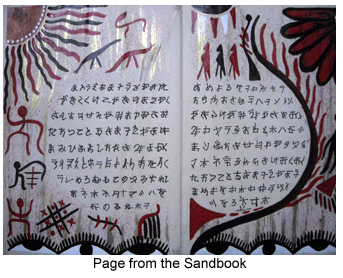 Now that I've completed writing the article I want to communicate. That has been the basic urge of creating art for us always. If someone publishes it, good for us, we'll be feeling better and if no one does I'll publish it on our blog. I am a believer of the D.I.Y motto.
Now that I've completed writing the article I want to communicate. That has been the basic urge of creating art for us always. If someone publishes it, good for us, we'll be feeling better and if no one does I'll publish it on our blog. I am a believer of the D.I.Y motto.
Some days ago, I was walking drowsily somewhere in Kolkata. Noon time; almost 50 days of hard work and I was feeling like a zombie in the heat. Everything was passing by, just passing by without making a sound. Visuals were distorted and things smelled harder than they should be. I could smell every detail of them. I was thinking if event management and filmmaking are same to an extent or not. Suddenly I come back to my senses with an earsplitting sound of honking. Harish Mukherjee Road. Noon time; a madman has just managed to escape somehow from coming under the wheels of a private car. He laughs, as if it was a big joke that he played with the car. Someone scolds him. He talks gibberish a while and moves away.
I start to walk again; and life has always been such a paradox you know!
A no-budget filmmaker